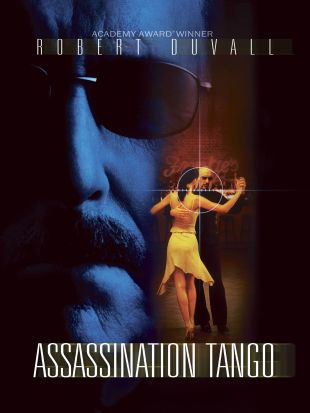
The first of two noteworthy cinematic releases from American Zoetrope in 2003, Robert Duvall's Assassination Tango assumed a much lower profile than the same year's Lost in Translation, and performed dismally at the box office. That's unfortunate, for on several levels, Tango is a fascinating and impressive picture. Duvall's film undertakes the same narrative approach as executive producer Francis Coppola's masterpiece The Conversation, and as such, it's something of a spiritual cousin to that film. Though ostensibly a thriller that follows the events leading up to an orchestrated murder, Tango discards many of the conventions of its genre, such as formulaic narrative twists and high-wire tension, in favor of a deliberately-paced character study of an eccentric and damaged subject. Duvall plays a retired hit man named John J. Anderson. When we first see him, he has settled down into a rather routine life in New York City, romancing a schoolteacher-cum-single mother named Maggie (Kathy Baker, splendid here). He gets summoned to travel to Argentina to rub out a military general, but must wait three weeks to carry out the homicide. Duvall has portrayed some bizarre characters in his career, but Anderson really takes the cake, outstripping even the gay thug he played in The Lightship in sheer oddness. This hired killer is a real paradox - cool and refined on the surface (witness his suave tango dancing in Argentina) but also maniacally self-defensive and hostile, as when an acquaintance makes an innocuous, offhanded comment about his appearance and gets an earful of profanity. What in Anderson's past can account for this vitriol? And likewise, how can we explain the bizarre degree of devotion that he projects toward Maggie's preteen daughter, or his insistence on being referred to as "daddy" by a hooker? Is he erotically attracted to young girls? We get a brief, tantalizing insight into the etiology of Anderson's behavior, in a wild scene where he begins shaking and muttering almost incoherently to himself, apparently revisiting a traumatic event from his past. But even this fails to clear up the ambiguities surrounding him. Some critics took the picture to task for that opaqueness; Roger Ebert, for instance, claimed that the movie "is too secretive about matters of the heart." But that may be Tango's greatest strength: in an era where seemingly every Hollywood picture conforms to a predictable narrative pattern, and every character seems like a transparent cliche, it's both refreshing and invigorating to find a subject as beguiling and complicated as the one at the center of this movie. We walk away with far more questions than answers, and it seems wholly appropriate that we never quite figure Anderson out. In addition to its mesmerizing characterization and an A-1 lead performance, the film benefits from an involving second half leading up to the homicide, and masterful direction throughout. Tango hit theaters five years after Duvall's even more acclaimed directorial effort The Apostle, and together, the pictures form a dynamite one-two punch. One only wishes that the legendary actor had stepped behind the camera more often during his career.
